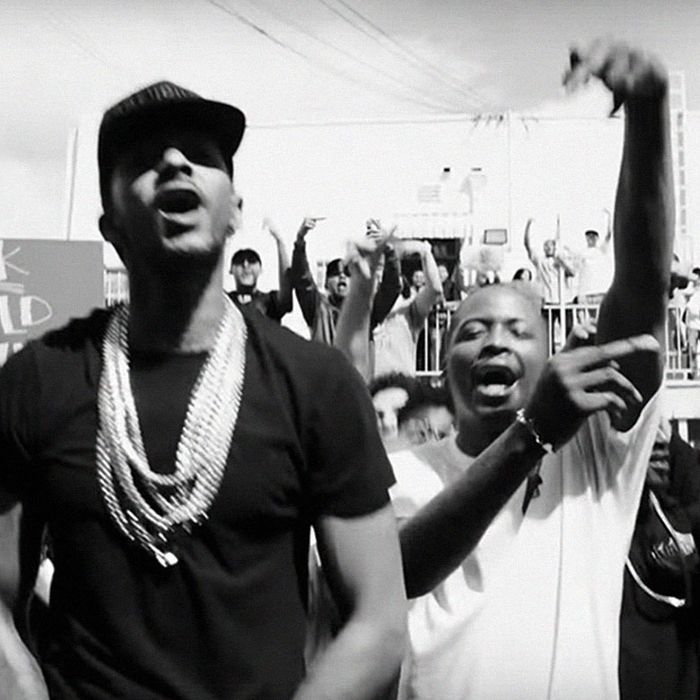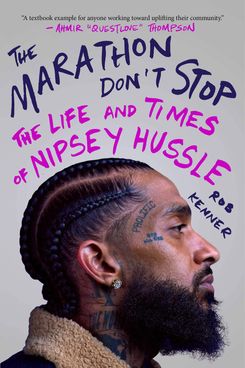
The excerpt below is from The Marathon Don’t Stop: The Life and Times of Nipsey Hussle, by Rob Kenner, which was released March 23. Nipsey Hussle was shot and killed in Los Angeles on March 31, 2019. Next Tuesday, March 30, marks five years since his and YG’s “FDT,” the first major anti-Trump protest song, dropped ahead of the 2016 election. The song ultimately kicked off a movement in hip-hop and beyond, and spooked the then-presidential nominee enough that he reportedly pressured YG’s record label to censor some of the song’s lyrics and the LAPD to shut down the music video shoot. This is the story of how the song came to be.
“When it’s all over all that counts is how the story’s told
So write my name down, write my aim down
To do this my way and carve my own lane out.”
—Nipsey Hussle, “Outro,” The Marathon Continues (2011)
When Obama was running for president in 2008, the unified power of hip-hop helped lift him to victory. Endorsements by rappers from Jay-Z and Jeezy to Common and Will.I.Am — not to mention two cover stories in Vibe magazine — helped to mobilize record turnout among a coalition of young voters from various cultures, ethnic groups, and economic backgrounds. Eight years later, America was faced with the most openly racist candidate in modern history, but the popular resistance was in disarray. Somebody needed to step up, harness the awesome power of hip-hop, and speak with a clear voice, calling Trump out on his bullshit. Los Angeles rapper YG and Nipsey Hussle were locking in to start work on their collaborative album, as outrage against Trump was reaching a fever pitch. “Everywhere I went, everybody’s findin’ out all the real shit about him,” YG recalled. He and Nip were always talking about using their platform to make a bold statement about real issues. As YG put it, they aspired to do “stuff other motherfuckers are not doing. So we finally hit the studio and really did it.”
“Over the last couple of years Trump’s been foreshadowing that he’s going to run,” said Nipsey. “I thought it was a joke. I knew he was a big celebrity, but I didn’t know it was possible for him to become president.”
Hussle noticed that the power of the Trump brand was working in his favor. “When you think about the 2016 election, all you really hear is Trump,” he observed. “You know Hillary, you know Bernie, but it seems like Trump’s name and voice is louder than the rest of them. So it was like, Are we actually taking this serious?” For Hussle, Trump was “just a privileged rich dude that got an out-of-touch view of the world. That made me like, dude is definitely out of his mind and our country sounded crazy for even taking him as a legitimate candidate.” “We weren’t feeling him,” YG said. “The world wasn’t feeling him.”
Having grown up in L.A., both YG and Hussle found Trump’s attacks on Mexican Americans particularly offensive. “I went to Paramount High School,” YG recalled. “It was probably like 95.9 percent Latino … All my homies grew up with Latino next-door neighbors, tryin’ to talk to they sisters and shit.” Hussle had always discouraged Black-on-brown (as well as Black-on-Black) conflict. “That’s divide and conquer, that’s Willie Lynch,” he told Davey D back in 2006. “I feel like we got a common enemy, so I don’t feel we got time to be beefin’.” In the decade since then, Hussle had put those views into practice, bringing different hoods and cultures together within his team, including his Mexican-born business partner and road manager Jorge Peniche.
“The way Trump was campaigning was really affecting my guy,” said Hussle, who gained a new appreciation for the impact of Trump’s rhetoric. “His situation was really in jeopardy. And watchin’ on TV, we like, ‘That’s not right.’ This dude went to college. This dude is a good person. I saw it up close and personal. Fortunately, Peniche was able to work out his situation, but as the son of an immigrant himself, Hussle knew that many others were still in jeopardy. Moreover, Hussle had a sizable Mexican fan base turning out for his concerts and supporting his movement. “I felt like they needed somebody to ride for ’em,” Nip said. “Because we relate in the struggle, and poverty, and not havin’ shit, and bein’ incarcerated — we relate. So that message ain’t something we feel neither.”
By the time Black people started getting thrown out of Trump rallies, YG felt they had no choice but to act. Trump was taking it too far. One day he put it to Nip: “Look, bro, if we doin’ a project called Two of AmeriKKKaz Most Wanted, we gotta have a song called ‘Fuck Donald Trump.’” Nip thought the idea was “tight,” like a 2016 version of N.W.A.’s “Fuck tha Police.”
His exact words, as YG remembered them, were: “Cuz, on Six-Owe, I feel you! Let’s do it!”
Everything unfolded quickly from that point. YG knew exactly which beat he wanted to use. When he explained the concept to DJ Swish, the producer thought it was something YG was doing for fun. “I never thought this would be popular,” Swish said, “but it fits well with the times.” DJ Mustard and Young Thug happened to be in the studio when the vocals were laid down. “We heard it back through the speakers and we already knew this was powerful,” Hussle later recalled. YG thought Nip should be the one to rap the verses. “You always talk about real shit,” he said. “I be on some turnt-up burnt-out shit.” But Nip challenged YG to set it off.
“Nah, you rap it!” Hussle said, and YG didn’t hesitate. As soon as he laid down his first verse — evoking the Rodney King riots and saying “I’m ’bout to turn Black Panther / Don’t let Donald Trump win, that nigga cancer!” — everybody started looking around like, We should lock the door and finish this. “Me as an artist, Nip as an artist, we very straight up and down,” YG said later. “It is what it is. It ain’t no hidden messages when we rapping. You gon’ know what the fuck we talkin’ ’bout.” By the final verse, YG and Nip were going back and forth, making plans to form a coalition that would disrupt Trump’s campaign by uniting the same people Trump sought to divide.
“Hold up, Nip, tell the world how you fuck with Mexicans,” YG said, after mentioning his Mexican plug and the Mexican mechanic who fixes the hydraulics on his lowrider. “It wouldn’t be the USA without Mexicans,” Nip replied — a statement that cut to the heart of Trump’s xenophobic attacks, and one that rang especially true in border states like California, Arizona, New Mexico, and Texas. While calling for Black love and brown pride, YG and Hussle were also demonstrating the possibility of reconciliation between red and blue.
With inspiration flowing, the record was done in less than an hour. In case anybody missed the significance of what was going on, YG closed out the song with a promise to pay Trump a visit. “When your L.A. rally? We gon’ crash your shit!”
As soon as they knocked out the vocals, YG turned to Nip. “I’m like, ‘Ay, bro … you ready?’”
“What you talkin’ ’bout?” Nip replied.
“You ready for what might come with this?” he said, on a serious note. “Like, niggas gonna get banned from shows. All the police, all them people, gonna be on us.”
“We already get backlash. We already can’t do this and this and this,” Nip replied. “Fuck it. Let’s make it worth something.”
They called the song “FDT” and dropped it on March 30, 2016.
Hip-hop’s powerful rebuke of the presumptive Republican candidate set the internet ablaze. The final version of the track included a sound bite of Trump talking about building his “great wall” on the Mexican border (and getting Mexico to pay for it!) as well as a clip of Tahjila Davis speaking about getting thrown out of the Trump rally. “We tryna touch the people,” YG told Billboard after the song was released. “We tryna motivate all the young people to vote. Really take your time ’cause it’s important, you feel me? If not, it could be all bad for us.”
“FDT” represented much more than just two rappers dissing a controversial politician. A Blood and a Crip had come together to make a song repping for Mexicans — whose L.A. street culture dates back even farther than the Slausons and the Businessmen. As hard as Nip and YG went in their verses, they still made space for open-minded white folks to join the movement. If historian Mike Davis was right when he said, “I don’t think there’s anything the police fear more than an end to gang warfare,” then “FDT” had to be their worst nightmare.


